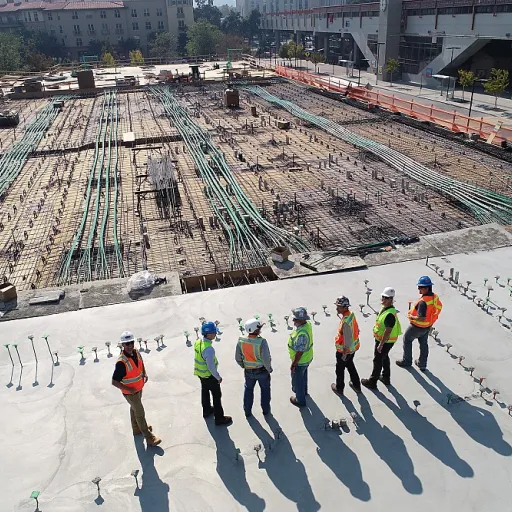
Understanding the Retail Landscape in New Zealand
Exploring the New Zealand Retail Environment
The retail sector in New Zealand is a dynamic and ever-evolving domain, characterized by a unique blend of local preferences, international influences, and innovative approaches to customer engagement. For office managers within New Zealand companies, understanding the intricacies of this landscape is crucial for the successful management of retail chain projects. To begin with, New Zealand's retail market is driven by diverse consumer demands. Retailers need to continuously adapt their product offerings and customer service strategies to remain competitive. Key aspects like reliable inventory management, efficient supply chains, and excellent customer experiences are pivotal. The geographical dispersion presents logistical challenges for resource allocation and supply chain management. This necessitates effective project management practices to ensure smooth processes across various store locations. Gantt charts and other project tools become essential for tracking tasks, timelines, and team resources efficiently. In addition, the digital transformation is reshaping the retail field. Retailers are increasingly leveraging data and technology to enhance their customer engagement and inventory management processes. Real-time sales data serves as a valuable resource for project managers to make informed decisions, optimize stock levels, and boost overall customer satisfaction. Understanding these elements helps in anticipating the challenges that may arise in retail projects and paves the way for strategic planning and project execution. Effective project management methodologies can play a significant role in addressing issues such as team coordination, ensuring that project managers and team members remain aligned in their objectives and tasks.Key Challenges in Retail Chain Project Management
Overcoming Common Project Management Hurdles
Managing retail chain projects in New Zealand presents a unique set of challenges. A common issue is the complexity of effectively managing inventory across multiple store locations. Retailers must consistently align inventory management strategies with customer demand to maintain high levels of customer satisfaction. Another challenge involves seamless data integration across the chain. This ensures that project managers can access and utilize sales data in real time. This transparency assists in making informed decisions that greatly impact customer service and overall customer experience. Obstacle in Team Collaboration Strong team collaboration is vital. However, aligning team members across various locations and functions can be difficult. Effective team coordination is critical to ensure that everyone is on track with tasks, resource allocation, and the timelines set by project managers. Additionally, supply chain management poses its own hurdles. An efficient supply chain ensures the timely delivery of products, maintaining the fluidity of the retail rollout process. Integrating advanced management services and tools like Gantt charts can aid project managers in tracking these processes more smoothly, helping them to overcome these challenges effectively. Addressing these challenges strategically helps in making retail projects successful. For those exploring employment opportunities in related fields, especially within Lewisville, TX, understanding these challenges can provide a solid foundation for a thriving career. You can learn more by exploring employment opportunities in Lewisville, TX, which offers insights into the global retail landscape and its various challenges.Strategic Planning for Retail Projects
Creating a Solid Foundation for Project Success
Strategic planning forms the backbone of any successful retail project in New Zealand's dynamic landscape. To address the myriad challenges and capitalize on opportunities, retailers must base their strategies on a comprehensive understanding of the retail environment and specific project goals. A well-structured strategic plan should include:- Integration of Sales and Inventory Data: Effective project management relies on the meticulous tracking of sales and inventory data. Utilizing tools like a gantt chart can help project managers ensure that inventory levels align with demand, optimizing customer satisfaction and supply chain processes.
- Time Management and Scheduling: Allocating time appropriately for every phase of the retail project, from planning to execution, is crucial. Gantt charts play an indispensable role in visualizing timelines and ensuring that team members are aware of project milestones and deadlines.
- Resource Allocation: Efficient resource utilization ensures that project tasks are completed on time without depleting the resources available. Retailers must allocate resources including human, financial, and technological thoughtfully to maximize the output of their retail rollouts.
- Tracking and Monitoring: Real-time tracking mechanisms are essential for maintaining an accurate overview of the project status. Through regular monitoring, project managers can swiftly address any deviation from the planned course, thus minimizing risks and ensuring the successful completion of retail projects.
Effective Communication and Team Coordination
Fostering Seamless Interactions and Teamwork
In the ever-evolving retail landscape of New Zealand, effective communication and team coordination form the backbone of successful retail chain management. Retail projects, often encompassing multiple stores and diverse regions, demand a synchronized approach to ensure that all team members are on the same wavelength, reducing bottlenecks and enhancing customer satisfaction. One crucial aspect lies in creating clear pathways for information flow. Project managers must ensure that each member of the team comprehends their specific roles and tasks within the broader supply chain processes. This can be achieved through regular meetings and updates, keeping everyone in the loop and allowing for real time insights into project progress. Here are some strategies to enhance communication and coordination among teams:- Implementing Gantt Charts: Utilizing Gantt charts can help project managers to visually track project timelines, resource allocation, and inventory management, thus offering a clear structure of tasks and deadlines.
- Utilizing Communication Tools: Leveraging advanced communication tools and platforms can enable seamless data sharing, fostering an environment where ideas can be exchanged swiftly and effectively.
- Inclusive Decision-Making: Encourage participation from diverse team members in decision-making processes. This not only enhances morale and engagement but also taps into a wider range of insights and experiences.
Leveraging Technology in Retail Project Management
Utilizing Modern Tools and Techniques
One of the most impactful ways to enhance retail project management is by leveraging technology. Retailers in New Zealand can benefit greatly from integrating advanced tools that aid in organizing and executing projects efficiently.- Project Management Software: Gantt charts and other project tracking tools can be instrumental. They provide project managers with visual timelines, helping them to track progress in real time. This clarity in tracking allows for effective resource allocation and helps in managing tasks smoothly.
- Inventory Management Systems: For a retail chain, maintaining an up-to-date inventory is crucial. Automated inventory management systems offer real-time data on product availability, helping ensure that stores are adequately stocked to meet customer demand and enhance the customer experience.
- Customer Data Analytics: Understanding customer behavior through data analytics can guide both strategic planning and operational decisions. By analyzing sales data, retailers can identify trends, forecast demand, and customize product offerings to improve customer satisfaction.
- Cloud-Based Solutions: With the rise of cloud technology, team members can access necessary documents and collaborate effectively from multiple locations. This flexibility is essential for coordinating teams across various retail stores, ensuring that everyone is aligned with the chain's objectives.
Case Studies of Successful Retail Projects
Success Stories in New Zealand's Retail Sector
New Zealand's retail landscape has seen remarkable transformations, with several projects standing out for their effective management and successful outcomes. These case studies highlight the importance of strategic planning, communication, and technology in overcoming challenges and achieving customer satisfaction.
Case Study 1: Streamlining Inventory Management
One of New Zealand's leading retail chains implemented a comprehensive inventory management system to address supply chain challenges. By leveraging real-time data and Gantt charts, project managers were able to track inventory levels accurately, ensuring optimal resource allocation. This approach not only reduced stockouts but also improved customer experience by ensuring product availability.
Case Study 2: Enhancing Customer Experience through Technology
A prominent retailer focused on enhancing customer service by integrating advanced technology into their retail rollout. By utilizing data analytics, the team could tailor customer interactions, leading to increased customer satisfaction. The project management team coordinated tasks effectively, ensuring that all team members were aligned with the project's objectives, ultimately boosting sales data.
Case Study 3: Effective Team Coordination in Store Launches
In another example, a retail chain successfully managed the launch of multiple stores across the country. The project managers used Gantt charts to keep track of tasks and timelines, ensuring that each store was ready on time. Effective communication among team members and stakeholders was crucial in overcoming logistical challenges, resulting in a seamless store opening process.
These case studies demonstrate that with the right strategies and tools, retail projects in New Zealand can overcome challenges and achieve remarkable success. By focusing on strategic planning, effective communication, and leveraging technology, retailers can enhance their project management processes and deliver exceptional customer experiences.













